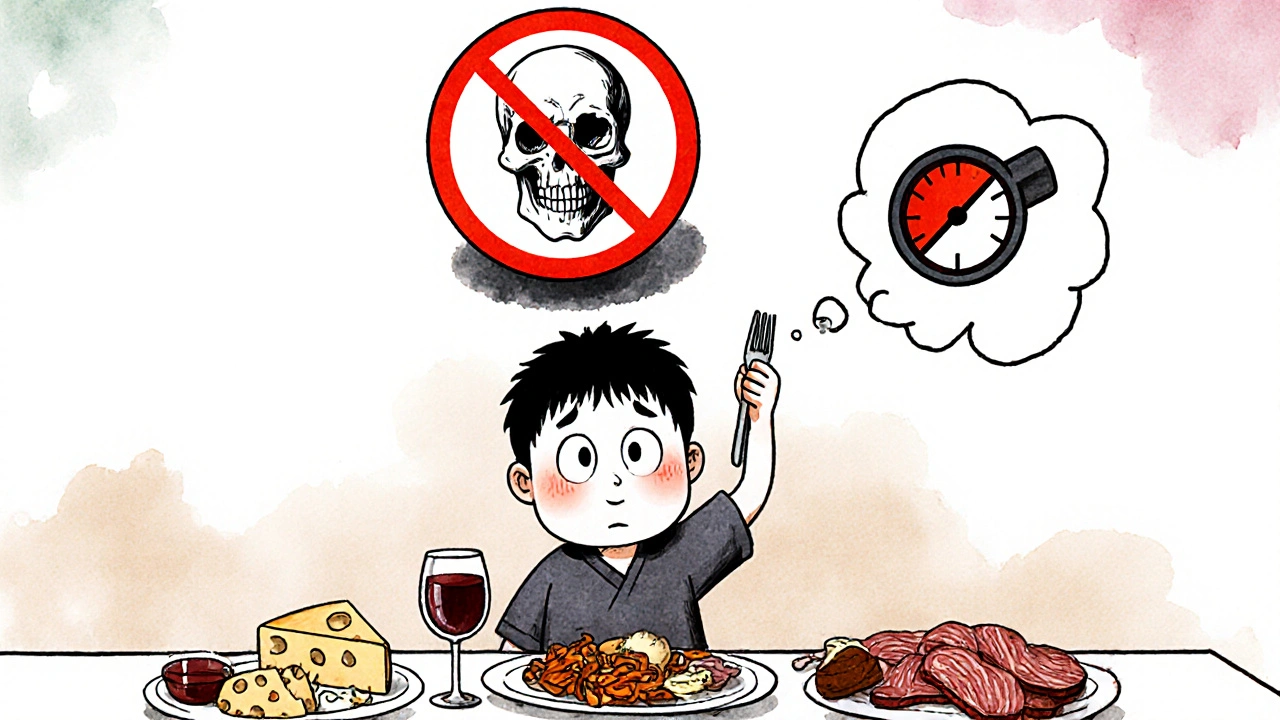Tyramine Diet: What It Is, Why It Matters, and Which Foods to Avoid
When you're on MAO inhibitors, a class of antidepressants that block enzymes breaking down tyramine. Also known as monoamine oxidase inhibitors, they can cause life-threatening blood pressure spikes if you eat foods high in tyramine, a naturally occurring compound formed when proteins break down during aging or fermentation. This isn't just a minor warning—it's a medical reality that affects thousands who take these drugs for depression, anxiety, or Parkinson’s.
Tyramine itself isn't dangerous for most people. Your body breaks it down quickly with an enzyme called monoamine oxidase. But when that enzyme is blocked by medication, tyramine builds up and forces your body to release massive amounts of norepinephrine. That spike can send your blood pressure through the roof—sometimes to levels that cause stroke or heart attack. The tyramine diet isn’t about cutting out flavor or living on bland food. It’s about avoiding specific aged, fermented, or spoiled items that pack a hidden punch.
Common tyramine-rich foods include aged cheeses like blue cheese, parmesan, and cheddar; cured meats like salami and pepperoni; fermented soy products like soy sauce and miso; tap beer and red wine; and overripe bananas or avocados. Even leftovers left in the fridge too long can become risky. Some people think they can get away with small amounts, but with MAO inhibitors, there’s no safe threshold. One bite of blue cheese or a glass of draft beer can trigger a reaction.
It’s not just about what you eat—it’s about timing and medication type. Older MAOIs like phenelzine and tranylcypromine are the biggest culprits. Newer ones like selegiline at low doses may be safer, but you still need to check with your doctor. And if you're taking other meds like dextromethorphan or certain decongestants, the risk grows even more. This isn’t a diet you pick up for weight loss or detox. It’s a medical necessity tied directly to your prescription.
People often think they can just skip the cheese and call it done. But tyramine hides in plain sight: in yeast extracts, sauerkraut, fava beans, and even some over-the-counter cough syrups. It’s why your pharmacist asks if you’re on MAOIs before selling you anything. The connection between food and drug isn’t theoretical—it’s backed by real cases of emergency room visits, some fatal.
If you're on one of these drugs, you don’t need to become a nutritionist. You need a simple, clear list of what to avoid and what’s safe. Fresh meats, pasteurized dairy, most fruits and veggies, and non-fermented grains are fine. The goal isn’t perfection—it’s awareness. Knowing the difference between a ripe banana and a brown one matters. Knowing why tap beer is riskier than bottled beer matters. These aren’t trivia—they’re safety checks.
The posts below give you real-world context: how certain medications like antidepressants and painkillers interact with what you eat, how side effects can sneak up on you, and why some drug combinations are far more dangerous than they seem. You’ll find practical advice on managing drug safety, spotting hidden risks, and making smart choices without feeling overwhelmed. This isn’t about fear. It’s about control—knowing what’s safe, why it matters, and how to live well while staying protected.

Monoamine Oxidase Inhibitors: What You Must Know About Side Effects and Dietary Restrictions
MAOIs are powerful antidepressants for treatment-resistant depression, but they come with strict dietary rules and dangerous drug interactions. Learn the real risks, how to stay safe, and why they still matter.